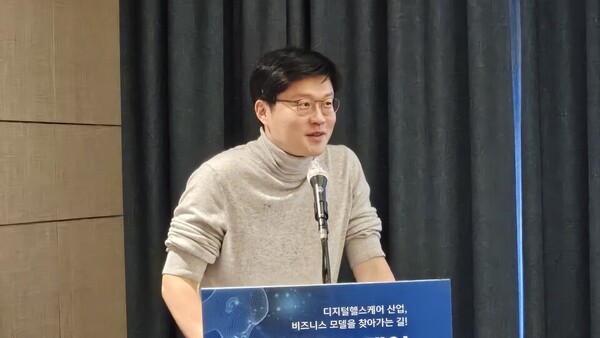
Regulators must make the most of ChatGPT to facilitate the examination of digital healthcare devices, an expert has proposed. To support companies that are challenging the development of digital healthcare, it is necessary to borrow the hand of artificial intelligence (AI), he added.
Welt CEO Kang Sung-jee made these and other points at the “Digital Healthcare Conference” organized by the Korea Electronics Association at Dragon City Hotel in Yongsan-gu, Seoul, last Friday.
Kang emphasized that digital healthcare, like software development, needs to be differentiated through continuous updates. He added that AI needs to be utilized by the Ministry of Food and Drug Safety (MFDS) in managing and reviewing digital healthcare to handle its job quickly.
"If digital healthcare is a cure in the form of software, I hope we can provide unique updates," Kang said. "The way we propose beta versions of software and compare the old and new versions can be applied to digital healthcare. This can happen simultaneously. However, it is difficult to do this by waiting two months to receive a review."
To speed up the process, it would be good to use AI to manage it, Kang emphasized.
“You can think of ChatGPT, which thinks like the MFDS by learning the MFDS guidelines," he said. "AI also simulates 'human intelligence' interactions, ensuring safer verification when developed through exchanges between AI systems."
He added that introducing AI that has learned the MFDS's guidelines could help digital healthcare companies receive feedback to find complementary points and lead to faster reviews.
"There are times when the reviewers at the MFDS look at companies' data, make judgments, and ask for more data, and such interaction can be present in AI," Kang said. "It can be used to find out what needs to be improved before being reviewed by an examiner, and then go directly to the examiner after passing the criteria."
Kang went on to say, "The MFDS does provide guidelines, but they are too broad and difficult to apply to individual cases. In addition, many companies do not have many channels to communicate with the MFDS. I think it is necessary to increase the competitiveness of Korean digital healthcare companies."
He stressed that institutional review boards (IRBs), which judge whether their institutions use certain medical devices by conducting clinical trials, need to utilize AI in ChatGPT to approve them. ChatGPT, which has learned the meeting minutes of each medical institution's IRB, should be able to advise researchers regarding IRB.
"I think IRB reviews can be done like that because the standards differ from hospital to hospital. Even if you bring the same protocol, this hospital may allow it, but another hospital may ask you to supplement it," Kang said.
Kang noted that it would be good to have a higher-level committee that can best represent the ethical standards and have ChatGPT learn the minutes of each IRB. And the IRBs of individual institutions can know what needs to be done in each case based on the conditions of the hospital when deciding (to grant permission for a clinical trial), he added.
He acknowledged that there may be concerns since it hasn't been tried in other countries but said that if Korea wants to lead the digital healthcare market, it needs to start.
"I know there are a lot of concerns. But I think the first step is to try it because the era of remaining content with becoming a fast follower is now over," Kang said in conclusion.
Related articles
- Korea's drug regulator leads international guidelines for AI and digital medical devices
- KBR forum to explore the impact of generative AI on healthcare's future
- Number of DTx license applications since April remains ‘zero’
- Welt, Aimmed face delays in launching Korea's first approved DTx devices
- What should Korean digital therapeutic device makers do to enter US market?

